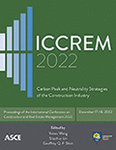A Case Study on the Collaborative Governance Mechanism of Old Residential Area Renovation Project from the Perspective of “Structure-Process”
Publication: ICCREM 2022
ABSTRACT
The renovation of old residential areas (ORA) is an important part of urban regeneration, and the renovation process involves multiple stakeholders with complexity and diversity. The collaborative governance of multiple stakeholders in the renovation process of complex ORA, especially at the mechanism level, has become a key research direction at present, which lacks fully exploration of elements and their interactions. The article adopts a “structure-procedure” collaborative governance analysis framework and selects a successful renovation project, Beijing Jinsong North Community as a case, to analyze the structure and procedure of collaborative governance of multiple stakeholders in the renovation of ORA. By doing so, this paper explores the elements and their interrelationships in the collaborative governance mechanism of ORA renovation. The contribution of this study lies in exploring practices of structure and procedure of collaborative governance mechanism of ORA renovation projects, which provides replicable and scalable reference for future ORA renovation projects.
Get full access to this article
View all available purchase options and get full access to this chapter.
REFERENCES
Ansell, C., and Gash, A. (2008). “Collaborative governance in theory and practice.” Journal of Public Administration Research and Theory, 18(4), 543–571.
Emerson, K., Nabatchi, T., and Balogh, S. (2011). “An integrative framework for collaborative governance.” Journal of Public Administration Research and Theory, 22(1), 1–29.
Guo, B., Li, Y., and Cao X. L. (2018). “Management dilemmas of old residential areas and their solutions: A case study of old neighborhoods in Shaanxi Province.” Urban Issues, (7), 70–76. (in Chinese).
Jiang, M., and Yuan, Y. (2020). “Serving the end-users: From Jinsong North community renovation.” Housing Industry, (5), 43–47. (in Chinese).
Kuai, Y. L., and Bai, M. Y. (2015). “Multiple stakeholders gaming in old neighborhood renovation decision-making: Beijing example.” Planner, 31(4), 48–54. (in Chinese).
Li, Z. Q. (2020). “Exploration of the model of social capital participation in the renovation of old residential areas: A case study of Jinsong neighborhood in Chaoyang district, Beijing.” Urban Development, (22), 68–69. (in Chinese).
Liao, Y. J. (2013). A Study of Urban Regeneration Based on Multi-stakeholder Partnership Governance. Chongqing University, Chongqing, China, 1–158. (in Chinese).
Lin, D., and Wang, H. (2013). Seamless government, People’s University of China Press, Beijing. (in Chinese).
Lin, H. J. (2019). Research on Cooperative Joint Governance in Urban “Old Housing Area” Renovation: Take Cangshan District of Fuzhou City as an Example. Fujian Normal University, Fuzhou, China, 1–61. (in Chinese).
Liu, P. G. (2020). “How is social governance community possible: Practical significance and construction of the across-department collaboration mechanism.” Henan Social Science, 28(09), 17–24. (in Chinese).
Sun, Y., Zhang, G. Z., Luo, Q. M., and Fan, Z. C. (2020). “Research on government coordination mechanism in old community reconstruction based on WSR system: Taking Shijingshan district in Beijing as an example.” Construction Science & Technology, (24), 38–41. (in Chinese).
Wang, S. P., and Guo, F. (2021). “Building multi-stakeholder collaborative mechanism in the renewal of old communities.” Journal of Urban Planning, (3), 50–57. (in Chinese).
Wang, J. (2019). “Why we should accelerate the transformation of old urban districts.” People’s Forum, (35), 129–131. (in Chinese).
Xie, H. S. (2016). “The division of authority and responsibility and funding mechanism for organic renewal in old neighborhoods.” China Real Estate, (36), 70–77. (in Chinese).
Xu, S. Y. (2021). “The participation of multiple subjects in the governance of old residential areas: An example of the reconstruction of green belts in n neighborhoods in Nanjing.” Modern Horticulture, 44(8), 186–187. (in Chinese).
Yang, S. T. (2021). “The basic experience of the ‘Jinsong model’.” Frontline, (8), 79–82. (in Chinese).
Zhang, R. Z. (2019). Research on the Strategy of Old Community Renewal in Guangzhou Based on the “Ternary Subject”. Guangdong University of Technology, Guangdong, China, 1–96. (in Chinese).
Zhang, S. Q., Zhen, F., Qin, X., and Tang, J. (2020). “The conceptual model and technical framework of participatory sensing and computing for urban community planning.” Geography Research, 39(7), 1580–1591. (in Chinese).
Zhang, Z. T., and Zhou, R. (2016). “Current status and prospects of collaborative governance theory research in China.” Social Governance, (3), 48–53. (in Chinese).
Zhu, D. M., and Gao, X. (2018). “Collaborative governance mechanism for urban renewal: A case study of shanghai.” Journal of Beijing University of Technology: Social Science Edition, 20(2), 58–66. (in Chinese).
Zou, B. (2015). “Transformation of incremental planning to stock planning: theoretical analysis and practical response.” Journal of Urban Planning, (5), 12–19. (in Chinese).
Information & Authors
Information
Published In
History
Published online: Dec 15, 2022
Authors
Metrics & Citations
Metrics
Citations
Download citation
If you have the appropriate software installed, you can download article citation data to the citation manager of your choice. Simply select your manager software from the list below and click Download.
